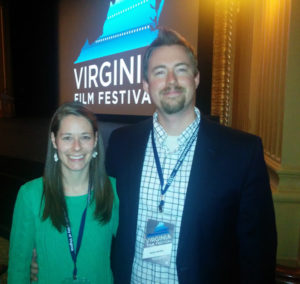This week on The Score – How have race relations changed in the ten years since Barack Obama became president? Is access to your favorite beer blocked by the government shutdown? Are the new conservatives opposed to free enterprise? What happens if Virginia raises its minimum wage?
http://bearingdrift.com/wp-content/uploads/TheScore-Jan19-2019-fullhour.mp3 [1]Talking about Race in America
 Next week the Miller Center for Public Affairs at the University of Virginia will be hosting a symposium on “Race in the decade since Obama [2].”
Next week the Miller Center for Public Affairs at the University of Virginia will be hosting a symposium on “Race in the decade since Obama [2].”
The event takes place on Tuesday, January 22, at Newcomb Hall from 4:00 o’clock to 5:30 p.m. The speakers are Kevin Gaines, the Julian Bond Professor of Civil Rights and Social Justice at the University of Virginia; Lauretta Charlton of the New York Times; and Melody Barnes, who is Professor of Practice in Public Affairs and Co-director of the University of Virginia’s Democracy Initiative.
To get a preview of the panel discussion for The Score, I spoke to Melody Barnes [3] at her Miller Center office in Charlottesville. Noting that January 20 will mark ten years since the inauguration of President Obama, she fielded my questions about the continuing conversation about race and race relations in the United States; whether Obama’s election demonstrated that we are in a “post-racial” era; and what “colorism” means within the African-American community, as highlighted on a recent episode [4] of the ABC-TV sitcom, black-ish.
Barnes was assistant to the president and director of the White House Domestic Policy Council in the Obama White House, so she brings an unusual perspective to a discussion of this sort. She contributed a chapter to Moneyball for Government [5] (2014), edited by Peter Orszag and Jim Nussle. Barnes is on Twitter as @MelodyCBarnes [6].
The January 22 discussion is free and open to the public. A registration page [2] can be found on the Miller Center’s web site [7].
Craft Brewing and the Shutdown
As the partial government shutdown moves into its second month, private businesses are beginning to feel its sting. Among other problems, the Department of Agriculture has been unable to issue reports on various crops, leaving farmers wondering [8] what they should plant this spring. That’s a topic for another day. Another business affected [9] is the craft brewing industry (which also relies on farmers for hops and barley and other inputs). Within the past four years, the number of craft brewers in Virginia has grown by 36 percent [10], with three breweries for every 100,000 residents of legal drinking age. But some brewers have run into a brick wall because the regulatory agency that controls their permits has been shut down.
 One of those is Atlas Brew Works [11] in Washington, D.C., which has been unable to get a permit [12] for the label on kegs of one of its newer brews, an apricot-infused drink called Precious One, because the government agency that issues such approvals has been shut down for the duration of the budget standoff between President Trump and Congress.
One of those is Atlas Brew Works [11] in Washington, D.C., which has been unable to get a permit [12] for the label on kegs of one of its newer brews, an apricot-infused drink called Precious One, because the government agency that issues such approvals has been shut down for the duration of the budget standoff between President Trump and Congress.
To learn more, I spoke with Alan Gura [13], an attorney based in Alexandria, Virginia, who recently sued the U.S. Attorney General on behalf of Atlas Brew Works.
Judge Christopher Cooper of the U.S. District Court for the District of Columbia will hold a motion hearing on the case (Atlas Brew Works v. Whitaker, 19-cv-0079) on Tuesday, January 22, at 2:00 p.m. No doubt news will ensue, based on Gura’s motion [14] on behalf of Atlas Brew Works. Follow Alan Gura on Twitter at @alangura [15] for updates on the case.
Changing Conservative Values
In recent weeks, social media has been buzzing about Tucker Carlson’s ranting on Fox News about how free markets destroy families and undermine society. Other pundits, like Ann Coulter, have chimed in with similar comments. President Trump infamously wrote on the margins of a policy proposal, “Trade is Bad.”
Michael Tanner, a recent guest on The Score [16], wrote in response to Carlson’s critique of free enterprise in National Review Online, an an article entitled “The Deceptive Lure of Carlsonomics [17]“:
I’m going to leave to others the debate about virtue and whether markets have contributed to the breakdown of morality, as Tucker warns. I will note, however, that those good old days weren’t all that moral if measured by how we treated women, minorities, and others. Nor should we assume that the coerced conformity actually represented some higher form of virtue.
But Tucker and his fellow populists also get the economics wrong. It is doubtful that Carlson or the others really want to return to the standards of living of, say, the 1950s. After all, it’s not just the elites who are better off today. Yes, the rich have gotten richer, but in many ways it’s the poor and the working class that have gained the most from the economic growth of the last half-century.
And it’s not just a question of the poor being able to buy cheap things, as Tucker says. By the end of the 1950s, the U.S. poverty rate stood at 22 percent, far higher than at any point during the depths of the Great Recession. Life expectancies for both men and women back then were ten years shorter than they are today. Culture and entertainment were far less accessible to the average American. Alcoholism was rampant. And, yes, things cost more. “Our old LaSalle” may have run great, but a car cost some 45 percent of an average worker’s annual income.
 Free enterprise and individual liberty used to be values widely held among conservatives. What happened to change their minds?
Free enterprise and individual liberty used to be values widely held among conservatives. What happened to change their minds?
To address this question, I spoke to Zachary Yost, a PhD student in political theory at the Catholic University of America, about this strange phenomenon. Zach is affiliated with Young Voices Advocates [18] and tweets at @ZacharyYost [19].
Minimum Wages, Job Losses
This year the Virginia General Assembly is considering legislation to raise the state’s minimum wage and change some of the affected categories of workers. Examples include SB1079 [20] (Spruill), HB1757 [21] (Carter), SB1200 [22] (Dance), HB2157 [23] (Plum), and SB1017 [24] (Marsden). Depending on when you read this, any of these or similar bills could still be alive or they might have been killed or consolidated with another delegate or senator’s proposal. The Virginia legislature moves fast in odd-numbered years.
 To find out whether raising Virginia’s minimum wage is a good idea, I went to the Mercatus Center at George Mason University to talk to economist Michael Farren [25]. Last week, Michael was a guest on The Score [26] to explain the latest jobs report from the U.S. Department of Labor.
To find out whether raising Virginia’s minimum wage is a good idea, I went to the Mercatus Center at George Mason University to talk to economist Michael Farren [25]. Last week, Michael was a guest on The Score [26] to explain the latest jobs report from the U.S. Department of Labor.
Farren has discussed minimum wage laws on C-SPAN [27] and written about the topic for Newsday [28], The Globe and Mail [29], The Hill [30], and The Bridge [31]. Listeners to The Score can follow him on Twitter at @MichaelDFarren [32],
From the Archives
 Since we talked about beer earlier in the program, I looked through the archives to find an interview from the 2014 Virginia Film Festival with documentary film makers Megan Troy and Aaron Stanley. They had just produced a documentary about the craft brewing industry in Virginia called “From Grain to Growler” and participated in a panel discussion [33] featuring several Virginia brewery owners and operators. The discussion was moderated by Virginia Film Festival programmer Wesley Harris and included April Anderson of Devil’s Backbone Brewery, Hunter Smith of Champion Brewing Company, Dave Warwick of Three Notch’d Brewing, and Jay Campbell of Beer Run, as well as Troy and Stanley.
Since we talked about beer earlier in the program, I looked through the archives to find an interview from the 2014 Virginia Film Festival with documentary film makers Megan Troy and Aaron Stanley. They had just produced a documentary about the craft brewing industry in Virginia called “From Grain to Growler” and participated in a panel discussion [33] featuring several Virginia brewery owners and operators. The discussion was moderated by Virginia Film Festival programmer Wesley Harris and included April Anderson of Devil’s Backbone Brewery, Hunter Smith of Champion Brewing Company, Dave Warwick of Three Notch’d Brewing, and Jay Campbell of Beer Run, as well as Troy and Stanley.
As explained on IMDB [34] by Megan Troy, “‘From Grain to Growler’ chronicles the explosion of craft beer in Virginia in recent years, and its impact on local economies, communities and agriculture. The producers traveled through the Commonwealth to breweries, beer festivals, hop yards, craft beer fan groups, and bottle shops.”
Coming Up
Next week’s episode of The Score will include a preview of the 2019 Virginia Festival of the Book [35] with festival director Jane Kulow, and a continuation of our exploration of beer regulations with Caleb Franz of the MilLiberty Initiative [36], plus more news, reviews, and interviews. Suggestions for topics are welcome; use the comments section below to offer your two cents about The Score.